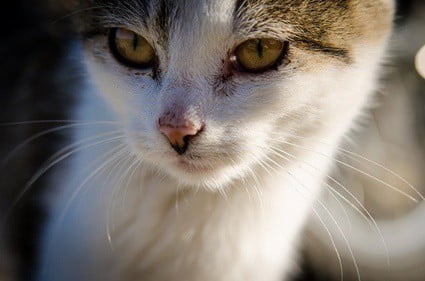Vaccines are necessary for most cats, especially those that spend most of their time outdoors. Although the experience is never pleasant, felines must be vaccinated against rabies by law. Also, other vaccinations are highly recommended to protect your cat against infectious diseases.
All vaccines have the potential to cause side effects in cats. Fever, lethargy, reduced appetite, and swelling are all common. Some cats may also have trouble walking and experience stomach upsets. However, these adverse effects should subside after 24 to 48 hours.
There is always risk involved in vaccinating a cat. These dangers alone are not enough to avoid getting feline vaccinations, though. You’ll need to make an informed decision about whether to vaccinate your cat based on the available medical evidence.
Types of Vaccinations for Cats
A vet will offeressential vaccinations for your cat. These protect against the following conditions:
- Rabies
- Feline Distemper (Panleukopenia), Feline Herpesvirus (FHV-1), and Feline Calicivirus (FCV)
- These three vaccines are combined into one (FVCRP vaccine)
- Feline Leukemia Virus (FeLV)
- Feline Immunodeficiency Virus (FIV)
- Feline Infectious Peritonitis (FIP)
- Bordetella
- Chlamydophila felis
- Feline
Of these vaccines, rabies is the only one that is required by law in most U.S. states. Check the requirements in your state using this table compiled by the American Veterinary Medical Association.
Even if you reside in a state that doesn’t mandate rabies shots by law, it remains advisable. The disease is commutable among animals and humans. The American Association of Feline Practitioners also considers the FVCRP to be a core vaccine. Beyond this, all other vaccines are optional.
How are Vaccines Administered to Cats?
Feline vaccinations are commonly administered by injection, typically behind the legs. Previously, many vets chose to administer shots to the neck. This was due to the flexibility of the skin in this area. It’s easier to stretch the skin and administer a shot.
In recent years, the risk of Feline Injection Site Sarcoma (FISS) has become more of a concern. This means that the neck should always be avoided. FISS can cause a cancerous tumor at the site of the vaccination. This tumor would need to be removed, and this is not easy around the neck.
A vaccination against rabies would usually happen in the right back leg, while a vaccination for FVCRP would happen in the right front leg.
Not all vaccines must be injected. FVCRP, FIP, and Bordetella can be inhaled nasally but may not be as effective as injections. If your cat takes its vaccinations intranasally, it will sneeze and sniff for a while afterward. Some streaming from the eyes and nose may also follow.
What Are the Most Common Side Effects of Cat Vaccinations?
A cat’s immune system starts to adapt following a vaccine, which means that a cat may feel sick. This is only a concern if it does not quickly recover. Some common side effects of feline vaccinations include:
- Fever
- Lethargy and low energy levels
- Lack of appetite
- Vomiting and diarrhea
- Swelling around the location of the injection
- Trouble walking
- Acting strangely
- Personality changes
These side effects should be short-lived. If your cat is still unwell 48 hours after its vaccination, then you should call your vet for advice.
Limping
As vaccinations are injected into a cat’s leg, some limited mobility is to be expected. Your cat may experience a small amount of swelling at the injection site, making it more difficult for your cat to move.
The FVCRP vaccine is most likely to cause limping because lameness is a symptom of feline calicivirus. Limping syndrome in cats is a temporary problem. Cats that struggle with this side effect bounce back as quickly as they experienced the issue.
Cats that have this vaccination often experience stiffened joints. This will naturally make them more lethargic. Any movement will be painful for the full duration of this side effect. Your vet may prescribe a feline-safe painkiller.
Vomiting And Diarrhea
Any vomiting should be monitored after vaccinations. A cat’s body will go through an adjustment after a vaccine is administered. That can upset your cat’s stomach. Diarrhea is also a possibility for the same reasons.

No Energy
It’s natural for a cat to become listless and sleepy after vaccines are administered. A feline that has been vaccinated will want to be on its own to get some sleep for several hours. It may also run a high fever.
You need to ensure that your cat is left alone. Tell any children in the home not to disturb your cat.
Not Eating
A loss of appetite is a common side effect of vaccinations. Any cat that has not eaten for 24 hours is a cause for concern. Cats lack the fat reserves to sustain them.
Assess whether your cat isn’t eating or is just reluctant to walk to its bowl. If your cat has little energy or limping syndrome, the walk can feel like a long journey, especially for an older cat with joint problems or arthritis pain.
Lump at the Site of The Vaccination
The most alarming reaction to vaccination is Feline Injection Site Sarcoma (FISS). This is a cancerous tumor that develops following inflammation around the site of the injection.
A vet must assess a cat with a lump that persists for weeks after vaccination. Another sign of FISS includes the lump exceeding 2cm in diameter, especially if it keeps growing.
If the sarcoma that is caused by vaccination is not treated, it will continue to grow. This, in turn, will allow cancerous cells to spread. The lungs and other internal organs will soon be affected.
It is not entirely clear why cats experience FISS. Some experts believe that the felines already have tumors. The inflammation caused by the vaccination activates the malignant tumor and causes it to spread.
If you present your cat to a vet with FISS, surgery will be required to remove the tumor. Your cat may also need to undergo radiotherapy or chemotherapy.
FISS remains rare. The journal Acta Veterinaria Scandinavica has stated that instances remain as low as 1 in 10,000.
Can Cats Be Allergic to Vaccines?
A cat can have an allergic reaction to a vaccination. Cats can be allergic to anything. They could even react to the rubber gloves that your vet wears to administer the vaccine.
An allergic reaction is more concerning than a typical ‘reaction’ to a vaccine. Signs that your cat is allergic to the vaccination include:
- Hives breaking out on the skin
- Swelling around the face, eyes, mouth, and neck
- Trouble breathing
- A sharp drop in body temperature around the paws and tail
- Low blood pressure and decreased heart rate
- Seizures and collapse
These reactions will be treated with steroids or antihistamines to reduce the impact of the allergy. In more severe cases, your cat may require intravenous fluids and further observation.

Cat Personality Changes After Vaccination
Some cats are temporarily different or never quite the same after vaccination. It’s rare, but it does happen. This is because the vaccine causes a chemical reaction in a cat’s brain. This normally lasts for around 48 hours.
If your cat seems to have undergone a complete personality transformation, seek further guidance from a vet. Make a note of all the changes to your cat’s behavior.
What Are the Side Effects of Vaccinations for Senior Cats?
Older cats have weaker immune systems and are more prone to illness. On the other, they’ll be more affected by any of the side effects. If your elderly cat has a chronic illness, then you should avoid vaccination. These treatments can aggravate problems with the heart and kidneys.
If your cat has tolerated vaccinations well in the past, then there is no reason to deny it boosters, provided that its health hasn’t recently faltered. It’s advisable to get your cat inoculated if your cat roams outside.
Respiratory illnesses, which certain vaccinations protect against, can be lethal for senior cats. You can find out more about infectious upper respiratory disease at Today’s Veterinary Practice (TVP).
Cats can react badly to vaccines, which is an unavoidable side effect of the process. These reactions should not be severe. In most cases, the risks posed by vaccination are outweighed by the safety that vaccines provide.

